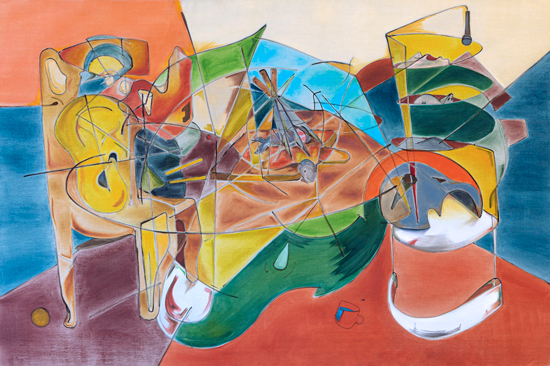The Depthwise & the Diagonal Instructor: Reza NegarestaniProgram: Critical Philosophy, History, Design & WorldmakingCredit(s): 1Date: July 25th, August 1st, 8th, 15th.Time: 10:00-12:30 ET

DESCRIPTION: This four-session Seminar undertakes an analysis of ‘the structure of world history’—to adopt Kojin Karatani’s term for organizing phenomena and processes which span across historical, economic, religious, political and mass psychological horizons. The analysis will be conducted in the vein of a synthesis between horizontalists and verticalists, where the difference between the two is often understood in terms of the emphasis put on the contrast between networks and bottom-up processes on the one hand and hierarchical models equipped with a central command and control on the other.
By reconceptualizing organizational structures as operating in a space that combines aspects of hierarchical (vertical) and networked (horizontal) models, this Seminar will examine contemporary frameworks in political, economic, and social systems’ increasing failure to address the challenges posed by complex systems that do not fit neatly into either horizontalist or verticalist paradigms. The structures shaping history reflect interactions that cut across these traditionally understood categories. This is the model of depth—understood computationally as a blend of these dimensions across scales of an organization—which is precisely what we must strive to comprehend in order to address the shortcomings of how we describe the structure of world history. Given that our interventive practices aimed at the structure of world history are beholden to how we describe and explain it first, then a notion of “diagonal depth” is necessary for describing phenomena which, despite their appearances, are neither truly horizontal nor vertical.
To this end, this Seminar integrates insights from political science, economics, complexity theory, and computer science to propose a conceptual framework adequate for analyzing historical evolutions and organizations and systems manifesting them. A number of concepts and frameworks adequate to the task of describing such systems will be introduced, including Charles Bennett’s “Logical Depth,” Paul Vitanyi and Ming Li’s work on Kolmogorov complexity and its applications, Andrée Ehresmann’s memory evolutive systems, Aurora Apolito on the problem of scale in anarcho-communism, and Remo Badii. Antonio Politi’s work on hierarchical and scaling problems in complexity sciences will be adapted to highlight the labor involved in interpreting and transforming them.
Ultimately, this Seminar underscores the necessity of an appropriate description of a complex model of depth—one that acknowledges its hybrid nature—as a prerequisite for any meaningful engagement or transformation. Without this understanding, attempts to address or intervene in such systems—the structure of world history writ large—risk being superficial and ineffective, if not exemplifications of malicious practical vagaries of which the contemporary political spectrum is replete.
IMAGE: Rasoul Ashtary, Interview, 2022
To see The New Centre Refund Policy CLICK HERE.
To see The New Centre Refund Policy CLICK HERE.